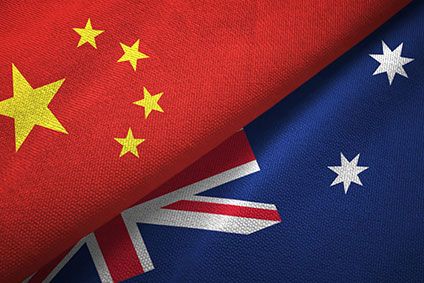What started in technology and was further fuelled by Covid-19 is now starting to impact Australia’s agri-food sector, Dean Best writes.
Ah, those heady days of late 2014 when much of Australia’s food industry could look forward to the further opening up of trade between the country and China.
It was in November that year when Canberra and Beijing announced a free trade agreement between the two countries, ChAFTA, a deal the Australian government said would help its agri-food industry compete with nations, such as New Zealand and Chile, that already a deal with Beijing – and provide a “significant advantage” over other, larger, trading rivals, such as the US, the EU and Canada.
Then Australian Prime Minister Tony Abbott said the agreement was the first China had struck “with a substantial economy, with a major economy”, adding: “It’s the most comprehensive agreement that China has concluded with anyone.”
And the then Parliamentary Secretary Josh Frydenberg (more on him later) pointed out how “up to 95%” of Australia’s exports to China would “over time” enter the country tariff-free.
The agreement entered into force in December 2015, offering Australia’s meat processors, dairy companies, barley growers, winemakers and infant-formula makers a potentially lucrative market.

US Tariffs are shifting - will you react or anticipate?
Don’t let policy changes catch you off guard. Stay proactive with real-time data and expert analysis.
By GlobalData“ChAFTA has built on Australia’s large and successful commercial relationship with China, by securing markets and providing Australians with even better access to China across a range of our key business interests, including goods, services and investment,” material on Australia’s Department of Foreign Affairs and Trade reads.
One can’t help but wonder if that passage now needs an asterisk.
Relations between Canberra and Beijing are anything but rosy. Ties have become increasingly strained since Australia’s refusal in February to allow Huawei a piece of the country’s 5G network and worsened further after Canberra’s call for an independent inquiry into Covid-19.
The impact is starting to be seen for parts of Australia’s food industry.
Beijing has slapped tariffs on Australia’s barley exports, placed restrictions on beef shipments and, last week, launched an anti-dumping probe on the Aussie wine industry.
Given this context, it was hardly a surprise to see this week Australia effectively block a move by one of China’s largest food companies for Aussie-based assets that have been up for sale.
This week, Mengniu walked away from its planned purchase of dairy assets from Australian food and beverage Lion (a business owned by Japan’s Kirin Holdings).
The AUD600m (US$438.7m) deal won approval from Australia’s competition regulator, the ACCC, in February
However, in a statement on Tuesday, the now Australia Treasurer Frydenberg said he had been advised the two companies had “mutually agreed to not proceed with the sale process”, adding: “This follows the communication of my preliminary view to Mengniu Dairy that the proposed acquisition would be contrary to the national interest.”
Last November, Australia gave the green light (albeit with conditions) to the sale of local infant-formula business Bellamy’s to Mengniu.
But times have changed and the end of the proposed Lion transaction is another sign of how relations between Australia and China are at a low ebb – and how the agri-food industry is being caught in the crossfire.
“There appears to be a lot of political capital in this country in some quarters in attacking China at the moment – Covid-19 has heightened this sadly. The government going out ahead of the global community to call for an investigation into the origins of the Covid-19 was a real flashpoint – diplomacy via headline,” Joanne Bills, director of Australia-based dairy consultants Freshagenda, says.
“We are doing a project at the moment on non-tariff measures from processed food exporters and we are hearing from them that it is increasingly difficult to do business in China. It’s always trick, but getting worse and they are all very worried about the political situation – particularly the meat guys.
“[Australia] has a lot of exposure to China as a food industry. It accounts for around 30% of the value of Australia’s ag, forestry and fisheries exports, so diversifying away is not easy. We need China a lot more than China needs us in ag and food.”
One Aussie food manufacturer with China as an important part of its business and growth plans this week gave an indication of how the tensions are shaping its decision-making.
Infant-formula manufacturer Bubs Australia struck a deal to can and package in China. The deal, Bubs noted, “mitigates key risks and provides a secure pathway to gaining full access to the world’s largest and fastest growing infant-formula market”.
Bills says: “We have picked up some ‘anecdata’ that there is a bit of backlash at consumer level. We have heard some Chinese shoppers don’t like Australia attacking their country and so prefer non-Australian brands.”
Kirin is now reported to be looking for non-Chinese buyers for its Australian assets. One Australian food major, Bega Cheese, has indicated it could be interested in buying the businesses.
“There doesn’t seem to be many obvious suitors for the Lion assets – and to be honest it was difficult to see why they were of interest to Mengniu,” Bills says. “The Lion assets and brands are very domestically focused in mostly white milk. They do have an excellent Iced Coffee brand but the cheese assets have already been purchased by [Canadian dairy group] Saputo. It didn’t seem like a strategic fit in the first place. White milk is highly competitive, dominated by supermarket labels – a low-margin, high-volume business – as it is in many places.”
While executives Lion and Kirin weigh up their next steps, food-industry boardrooms across Australia will be wondering how the broader problem of the relationship between Canberra and Beijing can improve.





